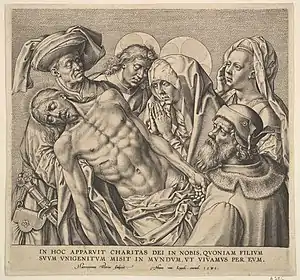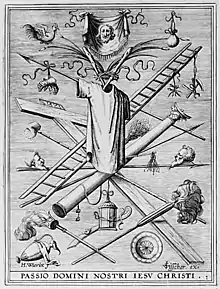Hieronymus Wierix
Hieronymus Wierix (1553–1619) was a Flemish engraver, draughtsman and publisher. He is known for his reproductive engravings after the work of well-known local and foreign artists including Albrecht Dürer. Together with other members of the Wierix family of engravers he played an important role in spreading appreciation for Netherlandish art abroad as well as in creating art that supported the Catholic cause in the Southern Netherlands.[1]
_-_Son_of_Justice_(Sol_Justitiae).jpg.webp)
Life
Hieronymus Wierix was born in Antwerp as the son of Anton Wierix I (c. 1520/25–c. 1572).[2] His father Anton was registered as a painter in 1545–6 but is occasionally also referred to as a cabinet maker. It is not believed that Anton I taught Hieronymous or his other two sons Johannes and Anton II. Hieronymus and Johannes are believed to have trained with a goldsmith while Anton II likely trained with an older brother, probably Johannes.[1] After his father death Hieronymus was placed under the guardianship of Sanson Catsopyn and Jheronimus Mannacker.[3]

His first engraving as independent master dates back to 1577. During the period of 1577–1580, he made a lot of prints for Willem van Haecht the Elder and Godevaard van Haecht. These works of him were mainly allegorical and political, where he reflected his sympathy for those who rebelled against the Spanish.[4]
Listed as Lutherans at the time of the Fall of Antwerp in 1585, the family members seem to have reconverted to Catholicism soon thereafter.[1] The three Wierix brothers gained a reputation for their disorderly conduct as evidenced by a 1587 letter by prominent publisher Christophe Plantin to the Jesuit priest Ferdinand Ximenes in which he complained that whoever wanted to employ the Wierix brothers had to look for them in the taverns, pay their debts and fines and recover their tools, since they would have pawned them. Plantin also wrote that after having worked for a few days the brothers would return to the tavern.[1]
His apprentices were Abraham van Merlen, Jan Baptist van den Sande the elder, and Jacob de Weert.[5] His daughter Christina married the engraver Jan Baptist Barbé, who later had his other daughter Cecilia (his sister-in-law) declared insane in order to claim her inheritance, which included a set of Dürer drawings.[5]
Work
Wierix is mostly known for his "very delicate religious prints on a very small scale". In 1570, Wierix worked in master work of Christoph Plantin where he was mastering engraving. He was only seventeen when he made his first engraving for Plantin. He made about 120 engravings for Plantin from 1569 to 1576.[6]

Selected works
Museum Boijmans Van Beuningen[7]
- The Decision to Grow Wheat in a Forest Area for More Profit, c. 1575 – 1585.
- Portrait of Volcxken Dierckx, 1579
- Saint Ambrose, 1586
- Conservat cuncta Cupido, 1600
- Portrait of Catherine-Henriette de Balzac Dentraigues, Marquise de Verneuil, 1600
National Gallery of Art, Washington[8]
- Fasciculus myrrhae dilectus meus mihi
- Dum pierulo fugendum ...
- O quam tristis et afflicta ..
- S. Lydtwina Virgo Schiedamensis ...
References
- Carl Van de Velde. "Wierix." Grove Art Online. Oxford Art Online. Oxford University Press. Web. 6 August 2019
- Carl Van de Velde. "Jan (Hans, Johannes) Wierix." Grove Art Online. Oxford Art Online. Oxford University Press. Web. 5 August 2019
- Les estampes des Wierix: conservées au Cabinet des estampes de la Bibliothèque royale Albert Ier : catalogue raisonné, enrichi de notes prises dans diverses autres collections, 第 3 篇,第 2 期 封面 Marie Mauquoy-Hendrickx Bibliothèque royale Albert Ier, 1983, p. 550 (in French)
- WIERIX, Hieronymus by Emil Krén and Daniel Marx Retrieved on 20 Mar 2018
- Hieronymus Wierix at The Netherlands Institute for Art History (in Dutch)
- Bowen, Karen L.; Imhof, Dirk (17 April 2008). Christopher Plantin and Engraved Book Illustrations in Sixteenth-Century Europe. Cambridge: Cambridge University Press. p. 48. ISBN 9780521852760.
- Works by Hieronymus Wierix Retrieved on 20 Mar 2018
- Hieronymus Wierix, 1553–1619 Retrieved on 20 Mar 2018
External links
![]() Media related to Hieronymus Wierix at Wikimedia Commons
Media related to Hieronymus Wierix at Wikimedia Commons